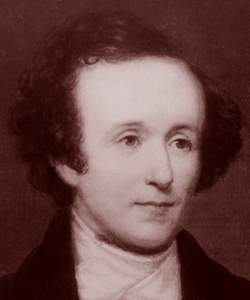John McClintock (American National Biography)
John McClintock (Dickinson Chronicles)
McClintock joined the Dickinson College faculty in Carlisle, Pennsylvania in 1836 as a professor of mathematics. In 1840 he became professor of Greek and Latin. In 1847, the town of Carlisle charged him with inciting a riot over slavery. He was tried in the county court and was acquitted. A year later, he resigned from the College and became the editor of the Methodist Quarterly Review. McClintock did not cut all ties with the College and served as a trustee from 1849 to 1859. He also maintained his intellectual career, publishing many educational volumes and texts, especially in classical and theological literature.
McClintock was one of two delegates, along with Bishop Matthew Simpson, to the British Wesleyan Conference in 1857. When he returned, he became the pastor of St. Paul's Church in New York. In 1860, he went abroad again, this time to France as pastor of the American Chapel in Paris. After four years in this post, he returned to serve again as pastor at St. Paul's. McClintock declined the presidency of Wesleyan University in 1851 and of Troy University in 1855. He did accept the position of president at Drew Theological Seminary in 1867 and remained there until his death in 1870.
He married Caroline Augusta Wakeman in 1836, became a widower on March 2, 1850 and married Catherine Wilkin in 1851. He had only one son, John Emory McClintock, born in 1840. John McClintock died March 4, 1870.
John McClintock (Notable Americans)
John McClintock (Appleton’s)
John McClintock (National Cyclopaedia)
John McClintock (New York Times)
Rev. John McClintock, D.D., LL.D.
Rev. JOHN McCLINTOCK, the President of Drew Theological Seminary, died at Madison, N. J., yesterday morning. Dr. McCLINTOCK was one of the ablest and most widely-known [taeologians] and writers in the Methodist Episcopal Church, having been from an early age prominent in the Church as a theological writer and as President of some of the leading educational institutions. He was born in 1815, and was distinguished in his early year for his scholastic attainments. At the age of 23 he occupied a Professorship in Dickinson College, at Carlisle, Penn., having for his associates some of the foremost men of the Methodist Church. Although regularly admitted to the ministry he was never for any considerable length of time in the field as an itinerant preacher, his time being occupied mainly in the colleges, and with work for the periodicals with which he was during the greater part of his time connected. In 1852 he was appointed by the General Conference editor of the Methodist Quarterly Review, published by the Methodist Book Concern in this City. It was during his editorship of the Review that M. AUGUSTINE COMTE published the more important of his works on the on the Positive Philosophy. The reviews which Dr. McCLINTOCK wrote in the Quarterly, entitled “The Beacon of the Nineteenth Century,” attracted universal attention both in this country and in Europe, recognizing as they did the genius and commanding powers of M. COMTE, while severely condemning the principles of his philosophy and destroying, in the opinions of may, their claim to the attention of the philosophical world. M. COMTE himself recognized the weight of Dr. McCLINTOCK’s criticisms, and corresponded with the editor in discussing them. Subsequently Dr. McCLINTOCK was elected President of Troy University, which position he soon afterwards vacated when it became apparent that the institution could not be supported by the Methodists. He was first pastor of St. Paul’s M.E. Church, in this city, the first editor of the Methodist, the organ of the lay [delegationists], and upon the establishment by Mr. DANIEL DREW of the Drew Theological Seminary at Madison, Dr. McCLINTOCK was selected as its first President. This position he filled with remarkable ability, organizing the various departments of the Seminary, and carrying them on successfully to his death. In his death the Methodist Episcopal Church loses one of its ablest divines, a man who has been always respected by the entire church for his great abilities, his energy and force of character. The circumstances attending his death, and the time and place of his burial, have not been learned.





